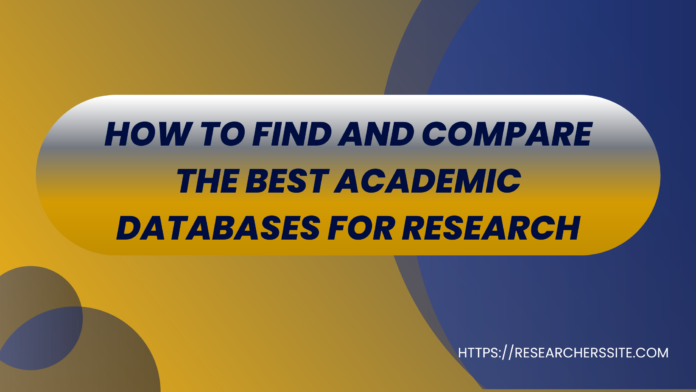This blog post will show you how to find and compare the best academic databases for your research. With a few simple steps, I will show you how to use SearchSmart.
In the digital age, academic research has become increasingly reliant on the vast array of scholarly resources available through academic databases.
These repositories of knowledge house a wealth of scholarly articles, research papers and other valuable information.
But with so many academic databases and search systems out there, how do you know which ones to use properly? How do you avoid missing important sources or wasting time on irrelevant ones?
That is where Search Smart comes in. SearchSmart is a free website that helps you compare and select the best academic databases for your research needs.
It covers 98 databases (as of writing this blog) across 26 subjects from arts and humanities to medicine and engineering. The site lets you filter and sort databases by various criteria, such as record types, search functionalities, subject coverage, and more.
This handy tool is designed and developed to help you find better, faster. Whether you are looking for scholarly publications, clinical trials, patents, or other types of records, it shows you the most relevant databases for your domain.
In addition to that, you can also rank databases according to their relative subject coverage. This helps you identify the ones that match your topic and allow you to search with precision.
SearchSmart is not just another database directory. It is a comprehensive, up-to-date, and transparent tool that provides you with user-friendly guidance and novel insights into the rich and evolving landscape of academic databases.
They use a combination of manual and automated methods to test and analyze the scholarly databases and search systems based on various criteria.
In an earlier post, I gave a detailed discussion of the best 5 multidisciplinary academic search engines.
Some of the Benefits of Using SearchSmart to Find and Compare Academic Databases
- The robust web app saves time and effort by finding the most suitable academic databases for your research needs in a few clicks.
- You can avoid missing important sources or wasting time on irrelevant ones by comparing and selecting databases based on their coverage and search functionalities.
- The features and limitations of different peer-reviewed databases and search systems can be learned, as well as how to use them properly.
- New databases and search options that you may not have noticed before are available for you to uncover.
- You can join a community of researchers who share your interest in finding better, faster, and smarter.
How to Use Search Smart to Find and Compare Academic Databases
Follow these easy steps to learn how to use SearchSmart free tool.
By following these simple steps, you can harness the power of SearchSmart tool to enhance the quality of your research, save time, and discover valuable resources.
Step #1
Go to https://www.searchsmart.org/ and click on the “Start comparison” button.

Step #2
Select the record types that you are looking for, such as scholarly articles, clinical trials, patents, etc. You can select more than one type if you want.

Step #3
Select the search functionalities that you want the databases to support, such as Boolean operators, truncation, phrase search, etc.
Multiple functionalities are available for you to select.
Step #4
Select the subjects that you are interested in, such as biochemistry, engineering, social sciences, etc.
Moreover, you can opt for more than one subject if you like.

Click on the “Rank databases according to relative subject coverage” option if you want to see the databases that specialize in your selected subjects on top of the list.
This will help you find the most relevant databases for your field.
Step #5
Click on the “Find!” button and wait for the results to load.


Now, browse through the list of research databases that match your criteria and click on the ones that you want to explore further. You will see a detailed analysis of each database, including its strengths and weaknesses, coverage, search system, and links to access it.
Now, choose the perfect academic databases for your research and unleash your smart search skills!
The tool allows you to find the best scholarly academic databases for your research needs.
We hope you enjoyed reading this blog post and learned more about SearchSmart, a free tool for discovering the best academic databases and their search systems.















